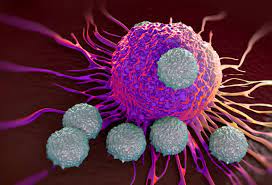
Diagnosed with Cancer? Your two greatest challenges are understanding cancer and understanding possible side effects from chemo and radiation. Knowledge is Power!
Learn about conventional, complementary, and integrative therapies.
Dealing with treatment side effects? Learn about evidence-based therapies to alleviate your symptoms.
Click the orange button to the right to learn more.
- You are here:
- Home »
- Blog »
- side effects ID and prevention »
- Revolutionary Treatments: How Immunotherapy is changing the Cancer Game?
Revolutionary Treatments: How Immunotherapy is changing the Cancer Game?

Cancer is a disease that affects thousands of people every year. Its not just about the
terrible symptoms and side effects; it also affects your body’s ability to fight infections
and slows down the immune system. However, there are new treatments for cancer that
use immunotherapy in combination with other therapies. This combination can have a
great impact on survival rates for many types of cancer today.
What is Immunotherapy?
Immunotherapy is a type of treatment that uses the patient’s own immune system to
fight cancer. It can be used alone or along with other treatments such as chemotherapy,
surgery, and radiation. One of its cons is that it can high sugar level for diabetic
patients.
Immunotherapy works by stimulating or enhancing the body’s natural defenses against
cancerous cells. This stimulates your own T-cells (a type of white blood cell) to
recognize and attack these abnormal cells before they have time to grow into tumors.
There are two main types: active immunotherapy and passive immunotherapy:
How Does Immunotherapy Work?
In order to understand how immunotherapy works, you need to know how the immune
system works. Your body’s immune system is made up of white blood cells, lymph
nodes and other parts of the body that work together to fight illnesses like cancer. You
should avoid any weight loss diet plan during this therapy.
Immunotherapy uses this same process in order to help your body fight off cancerous
cells. There are two main types: systemic therapies and targeted therapies
Types of Immunotherapy
Checkpoint inhibitors are a type of immunotherapy drug that prevents cancer
cells from hiding from the immune system.
Examples include:
- Opdivo (nivolumab)
Keytruda (pembrolizumab)
Yervoy (ipilimumab)
How Are These Treatments Different?
Traditional chemotherapy works by killing fast-dividing cells, including cancer cells. But
it can also damage healthy tissue. Immunotherapy is a new approach to cancer
treatment that stimulates the immune system to attack cancer cells. It has been used to
treat some cancers since the 1990s and has become more widely available in recent
years as researchers learn more about how it works and develop better treatments with
fewer side effects.
Clinical Trials for Immunotherapy in Breast Cancer
Now that you know what to expect from your clinical trial, here are some tips for getting
the most out of it.
• Participate: If you find a promising study in your area or at an institution close to
home (or both), contact them directly about participating in their research
program – they'll likely have more information than we do on how best customize
treatment according to each patient's individual needs based on test results from
blood work taken before beginning treatment.
Who are Eligible to Participate in these Trials?
• Patients with melanoma who have not received any previous immunotherapy
treatment for their disease.
• Patients with advanced or metastatic colorectal cancer that has not responded
well (or at all) to standard chemotherapy and/or other treatments, such as
radiation therapy, targeted therapies and/or surgery.
What are the Benefits of Participating in these Trials?
• You may experience fewer side effects from your treatment regimen because
you will be receiving less medication than if you were treated on your own
without a clinical trial. Your doctor will carefully monitor how well your body
responds to treatment so that dosage levels can be adjusted accordingly if
needed. This type of individualized approach allows researchers to collect more
accurate data about how effective their new drugs really are when used together
with other medications or procedures like surgery or radiation therapy.
Funding for Clinical Trials and a Patients Role in Research Studies
Patients can help find cures for cancer by participating in clinical trials. A clinical trial is a
research study that tests new ways to prevent, detect, or treat disease. The goal of any
cancer treatment is to shrink tumors and stop them from spreading to other parts of the
body. Clinical trials test new drugs and treatments for patients with cancerous tumors
who have not responded well to other therapies.
Patients may also be able to help scientists learn more about the causes of different
types of cancers by donating samples from their tumors or blood samples (biopsies).
These samples are then sent out for analysis by researchers around the world who use
them as part of their research efforts into finding better ways to prevent and treat
various forms of cancer across all ages groups regardless whether they're adults or
children suffering from this devastating illness.
The future of cancer treatment seems brighter than ever before.
The future of cancer treatment seems brighter than ever before. There are many new
options for patients with cancer, and the future of cancer treatment is promising.
The future of cancer treatment is better than ever before!
To Learn More about the pros and cons of immunotherapy- click now
Conclusion
We hope this article has helped you understand the basics of immunotherapy and its
potential for treating breast cancer. As more clinical trials are completed, we can expect
to see even more promising results in the future!

